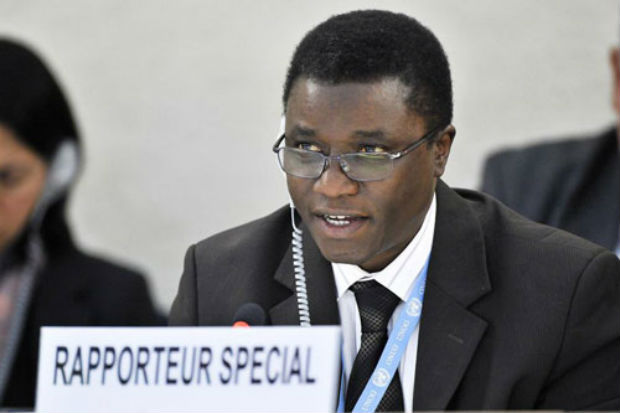UN expert hits PH military for ‘distortion’
The United Nations (UN) Special Rapporteur on the human rights of internally displaced persons has criticized the Armed Forces of the Philippines (AFP) for its “incorrect” portrayal of his findings.
Special Rapporteur Chaloka Beyani described the AFP Eastern Mindanao Command’s August 7 press release as “incorrect, unacceptable and a gross distortion of [his] views.”
Beyani’s statement, released by the UN Information Center (UNIC) in Manila, said the Eastern Mindanao Command misquoted him to allege that indigenous persons (IPs or lumads) staying at the United Church of Christ in the Philippines (UCCP) Haran facility in Davao City were victims of human trafficking and were being held against their will.
“Let me be absolutely clear, the indigenous persons in Davao are not victims of human trafficking. I was explicit in my discussions with the senior AFP representatives on multiple occasions, and indeed at my press conference that the indigenous persons concerned should under no circumstances be considered to fall into the category of trafficked persons,” Beyani said.
He said he interviewed the lumads who informed him that they went to UCCP on their own will “in response to the militarization of their lands and territories and forced recruitment into paramilitary groups operating under the auspices of the AFP.”
Article continues after this advertisementBeyani said he described the indigenous peoples as being “manipulated” not because of the UCCP but because of the “attempt to forcibly move them out of the UCCP facility without proper and adequate consultation with them.”
Article continues after this advertisementREAD: Catamco, police try to force lumads to go home
The military and Cotabato Representative Nancy Catamco have been at odds with the IP group following a supposed dialogue where the lawmaker was accused of “humiliating” the lumads.
READ: Lawmaker accused of ‘humiliating’ lumad
Catamco wanted the group to leave the area and return to their houses. Instead of facilitating a dialogue between the group and the National Commission of Indigenous Peoples, it was the military that showed up in the meeting.
The lawmaker, on the other hand, claimed that the IPs were being held against their will and should be rescued.
Militant congressmen, on the other hand, criticized Catamco and the military for preventing the lumads from “expressing their real sentiments” during the meeting.
READ: Displaced lumad shun solon’s ‘rescue’ attempt
Beyani said he had called for a peaceful resolution of the situation “in full consultation with the indigenous peoples concerned and their legitimate leaders.”
“It is essential to avoid any form of manipulation of their situation by any party, governmental or non-governmental. The human rights, security and wishes of the indigenous peoples themselves must be the highest priority. No attempts should be made to forcibly remove the people from the UCCP facility,” he said.
Beyani explained that IPs have long been vulnerable to “conflict-induced displacement,” especially in Mindanao due to the conflict between the military and the New People’s Army.
“I heard from the AFP its assertion that it is seeking to protect the communities and provide services to them in conflict regions; however the displaced IPs made it clear that it is their presence and that of the paramilitary groups in their communities that continues to create anxiety amongst the indigenous communities,” he said.
Although the IPs he interviewed wanted to return to their lands, they do not feel safe because of the continued militarization.
“They described to me their concerns including their alleged forced recruitment into paramilitary groups, known as Alamara, under the auspices of the AFP and harassment in the context of the on-going conflict between the AFP and the NPA. Schools have reportedly been closed and/or occupied by the AFP or Alamara, hampering the access to education of indigenous children,” the UN expert said.
At the same time, Beyani said the lumads’ situation is “neither acceptable nor sustainable.”
“It is essential to find a rapid and peaceful solution to their situation in full consultation with their legitimate leaders, with their voluntary and secure return to their ancestral lands being a high priority,” he said. CB
